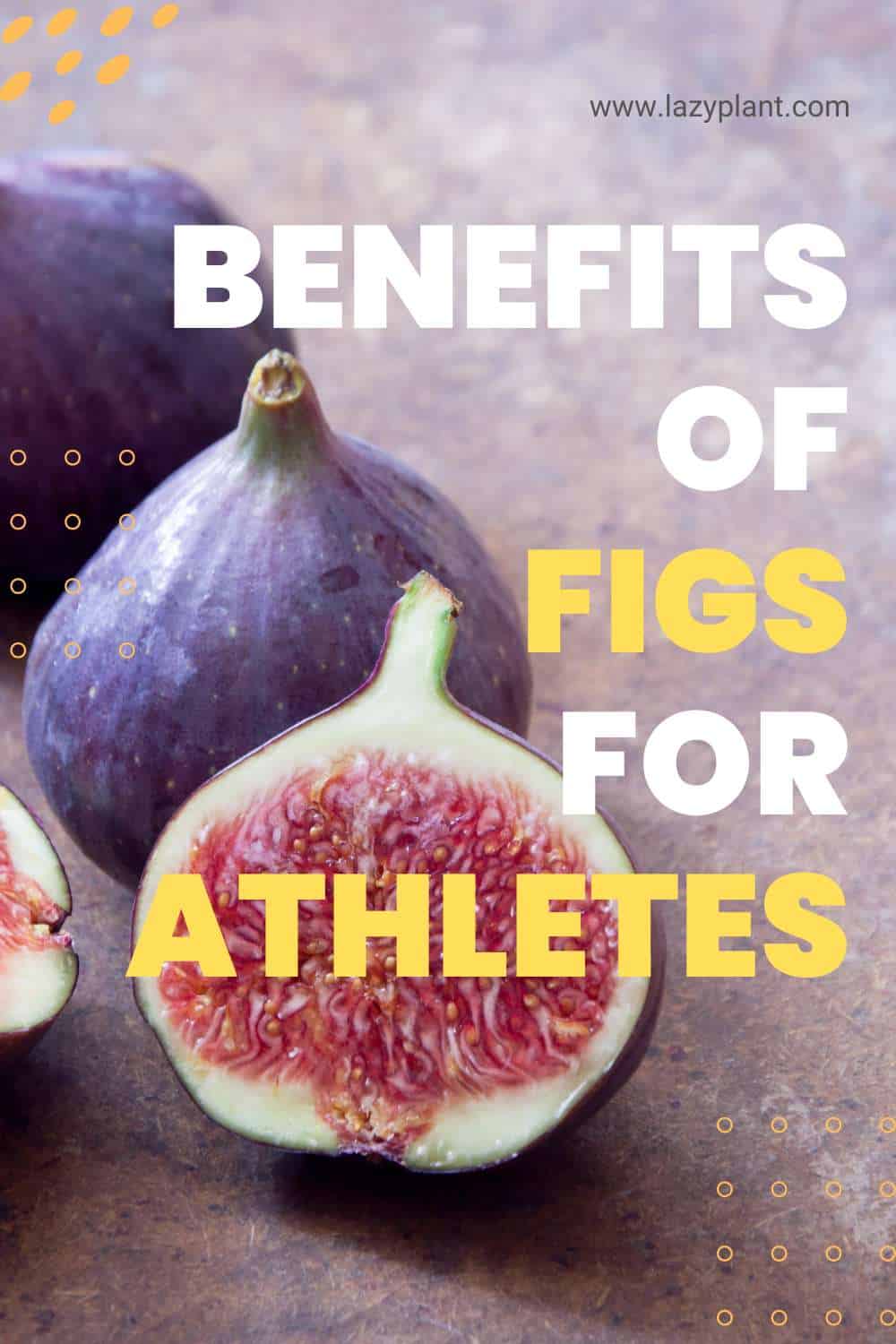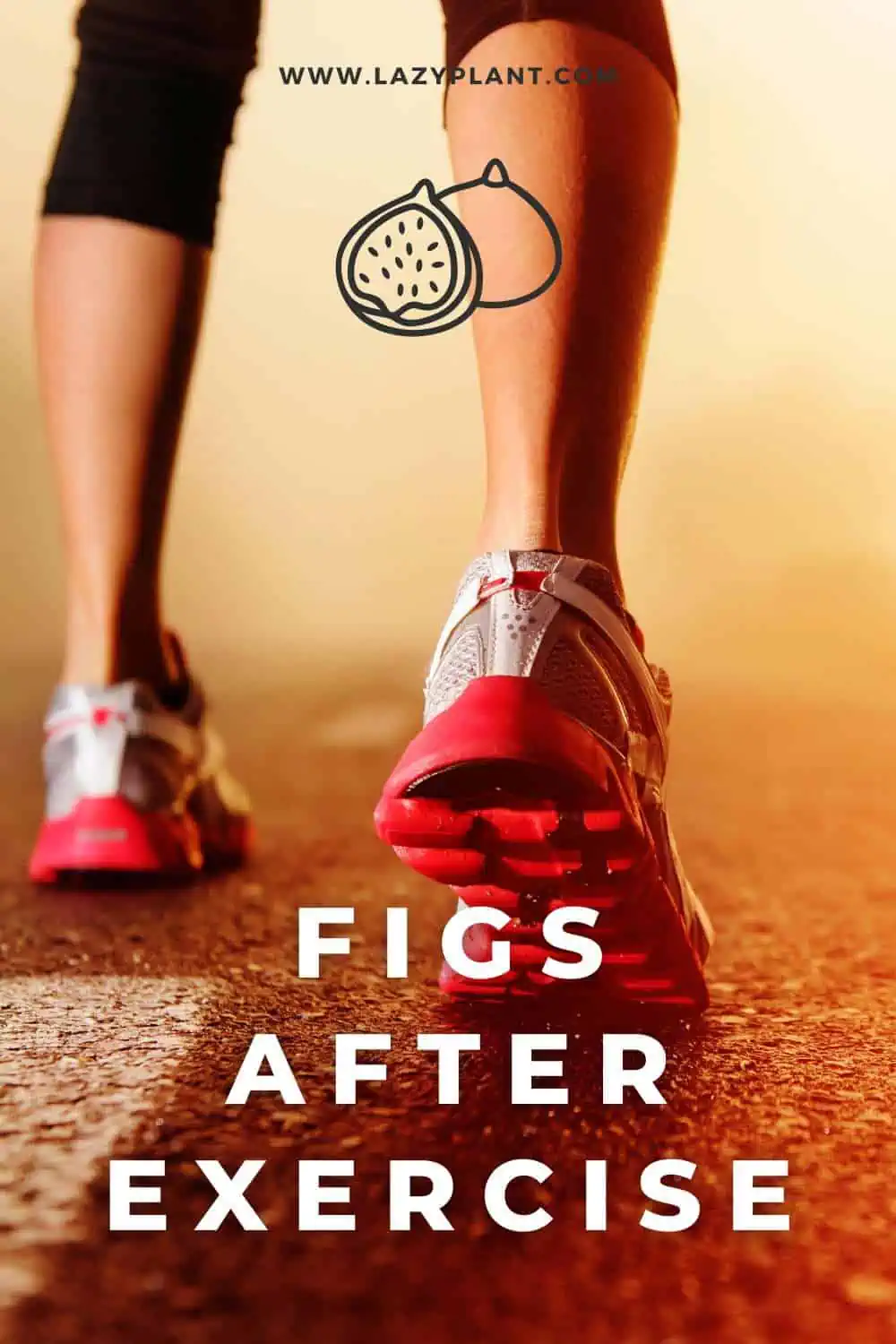Figs are good for athletes because they:
- provide energy for hours
- delay fatigue
- reduce recovery time
- promote athletic performance
- hydrate the body
- stimulate muscle pump
- boost the immune system
- protect digestive health
- can be a key ingredient for your favorite post-workout recipes.
Figs are an excellent post-workout snack
Athletes can eat dried figs as a post-workout snack. They promote recovery as they’re among the most nutrient-dense foods you can eat daily. Figs are packed with antioxidant compounds, vitamins, and minerals that have beneficial effects on athletic performance.
Replenish muscle glycogen
Firstly, dried figs can be an excellent post-workout snack because they’re a healthy source of sugar. A small serving provides about 12 grams of sugar.
Getting a high quantity of sugar after an intense workout enhances muscle recovery. Sugar helps replenish muscle glycogen stores.
Actually, the best time of the day to enjoy our favorite sugar-rich candy or beverage (e.g. Coke) is after exercise.
Antioxidants enhance recovery!
Figs are a superfood. They’re among the richest foods in antioxidants you can consume. They’re particularly rich in phenolic acids and flavonoids. The peel of figs has the highest antioxidant capacity.[1,2]
Certain fig varieties have a higher antioxidant content than berries and tea! Green tea also supports recovery. Both endurance athletes and athletes of bodybuilding should drink it regularly.
Antioxidant compounds promote recovery, as they fight exercise-induced oxidative stress.
Chronic low-grade oxidative stress may lead to fatigue, inflammations, and muscle or joint pain. It can have detrimental effects on sports performance.
Amateur and elite athletes should follow a diet high in antioxidants for better physical performance. Better avoid getting extremely high dosages from supplements, though. They may have adverse effects on muscle gain or strength.
Hydrate the body
Moreover, eating figs after demanding exercise is good for athletes because they help replenish essential electrolytes, hydrating the body.
Drinking tap water without properly replenishing electrolytes can have serious adverse effects like cramps! Runners and other endurance athletes are at the highest risk of electrolyte imbalances.
Just a small serving of dried figs provides:
- calcium 4% DV
- magnesium 4% DV
- potassium 5% DV
Iron
Furthermore, a serving of dried figs provides 3% of the recommended daily intake of iron.
Iron deficiency is pretty common among athletes. Especially among those who regularly perform exhaustive training sessions.
So, we should be very cautious with the consumed quantities.
Iron is crucial for athletic performance and good health. It’s involved in energy metabolism and oxygen transport to name a few benefits.[3]
One of the best vegan iron sources is tahini. In fact, tahini is an ideal food for athletes. We should incorporate it into our post-workout recipes.
Copper
Figs are particularly rich in copper. A serving provides about 8% of the Daily Value.[4]
Copper is an essential trace mineral. It enhances iron absorption, and helps build red blood cells, collagen, and connective tissue![5]
Almost two-thirds of the body’s copper is located in the skeleton and the muscles.

Thus, athletes should be very cautious with maintaining normal levels of copper. However, this may be tricky as exhaustive workouts may deplete copper stores.
However, athletes don’t have to get extremely high dosages from supplements. A well-balanced diet can provide adequate amounts of copper.
Manganese
A serving of dried also provides decent amounts of manganese. It provides 5.6% of the Daily Value.
Manganese is vital for improved physical performance. It plays a role in protein and carbohydrate metabolism. Moreover, it’s essential for strong bones and good immunity.[6]
Can athletes eat figs before exercise?
Figs are a great pre-workout snack as well.
Provide extra energy to athletes
Firstly, dried and fresh figs provide steady levels of energy for hours.
They have a low glycemic index. It’s between 54 and 61.
That’s because figs are packed with fiber, which delays digestion and controls glucose responses.
Additionally, about 48% of the sugars of figs are fructose. Fructose doesn’t spike blood sugar as glucose. It has to be metabolized by the liver first.
Athletes should consume pre-workout snacks containing both glucose and fructose.
Antioxidants may delay fatigue!
Above all, eating figs before a workout might help athletes work out harder and for longer.
The antioxidant compounds in figs appear to play a key role in delaying fatigue.
Demanding exercise substantially increases the production of reactive oxygen and nitrogen species. Antioxidants ensure that these compounds remain within a healthy and balanced range.
Hence, antioxidants may delay fatigue and reduce the recovery period.
A diet rich in antioxidants may also reduce the risk of the development of musculoskeletal injuries![7]
May improve blood flow
Moreover, the consumption of figs as well as other fruits, vegetables, and herbs packed with antioxidants may increase muscle flow! They improve vasodilatory capacity.[8]
Muscle pump is important for athletes of bodybuilding.
Optimum blood flow is critical for runners and other endurance athletes as well. It supports better physical performance.
How long before exercise can athletes eat figs?
However, both endurance athletes and athletes of bodybuilding should avoid consuming fresh or dried figs right before exercise.
Figs are rich in fiber. In fact, just a small serving of dried figs contains 2.5 grams of fiber. This is 9% of the recommended daily intake on a 2,000-calorie diet.
A high fiber intake before exercise can impair athletic performance. It can cause bloating, stomach cramps, discomfort, and various other adverse effects.
Therefore, athletes should consume dried or fresh figs at least a couple of hours before a workout.
Benefits of fiber for athletes
Athletes should follow a fiber-rich diet, though. Fiber has many benefits for sports performance and overall health.
For instance, high fiber intake is beneficial for gut microbiota. Healthy gut microbiota supports exercise performance.[9]
Moreover, fiber helps athletes maintain the desired body weight during the season or a competitive event.
Fruits, vegetables, beans, and whole grains are the main dietary sources of fiber.
Figs may protect the good health of athletes!
Additionally, dried or fresh figs, as part of a well-balanced diet, may protect the good health of athletes. So, they can perform more intense workouts per year!
Boost the immune system!
Figs may boost the immune system, due to their high polyphenol capacity. These health-promoting compounds aid in the management of various diseases. Actually, figs seem to have protective properties against the flu.[10,11]
May lower cholesterol
Moreover, figs may regulate high cholesterol and triglyceride levels.
Many bodybuilders consume high amounts of animal-derived foods in order to boost their protein intake.
However, animal-derived foods are rich in saturated fat, which can cause elevated blood LDL cholesterol if overconsumed. This can be dangerous for the heart.[12]

Manganese and copper, which are naturally present in figs in high amounts, are implicated in cholesterol metabolism.[13]
Flavonoids in figs reduce blood cholesterol levels as well.[14]
Above all, in order to protect your heart, you should follow a well-balanced plant-based diet with low quantities of saturated fat.
May improve the digestive health of athletes!
In addition, athletes should consume figs, as they may improve digestive health. They appear to alleviate symptoms of digestive disorders, like irritable bowel syndrome.[15]
Treating stomach issues could have a huge beneficial effect on exercise performance.
How many figs can an athlete eat a day?
Most people who follow a sedentary life can eat 2-3 dried figs once a day. They have about 65 calories. This is considered a serving.
However, athletes can consume much higher quantities, as they have increased energy needs. Long-distance endurance athletes or athletes of bodybuilding in the bulking phase can consume 5-6 dried figs before or after strenuous exercise. This dose provides about 24 grams of sugar and 130 calories.
Fitness enthusiasts who work out for a lean body better stick to the standard dose of 3 dried figs a day, though.
Can athletes on keto consume figs?
No, keto athletes can’t consume figs. They contain way too much sugar.
Athletes with diabetes can consume reasonable amounts of figs, though. In fact, regular fig consumption as part of a well-balanced diet appears to have beneficial effects on glucose levels!
What’s the best time of the day to consume dried figs?
A great time to eat dried figs for athletes is after intense exercise.
However, the best time to consume dried figs for most people is at breakfast. When consumed in the morning, figs support weight loss. Also, they protect the skin, eyes, and hair from air pollution or UV rays to name a few health benefits.
Easy & quick post-workout fig recipes
Incorporating figs into your post-workout meal routine is easy. Here you’ll find 15 recipe ideas with figs, ideal for athletes.
Greek yogurt
- Fig and Greek Yogurt Parfait:
- Layer Greek yogurt with chopped fresh figs, granola, and a drizzle of honey. Repeat the layers and top with a sprinkle of nuts or seeds for added crunch and nutrition.
Another excellent food for athletes is granola. As it’s packed with electrolytes, protein, fiber, and antioxidants, granola is an ideal ingredient for your post-workout recipes.
- Fig and Greek Yogurt Bowl:
- In a bowl, combine Greek yogurt, sliced figs, chia seeds, and a handful of mixed berries. Add a dollop of almond butter or peanut butter for extra flavor and protein.
- Fig and Greek Yogurt Energy Bites:
- Mix together Greek yogurt, chopped dried figs, rolled oats, honey, and a pinch of cinnamon. Form the mixture into bite-sized balls and refrigerate for an easy grab-and-go snack.
The combination of Greek yogurt with oats makes one of the most nutrient-dense foods athletes can eat daily. It supports weight loss as well.
- Fig and Greek Yogurt Toast:
- Spread Greek yogurt on whole-grain toast and top with sliced figs, a drizzle of honey, and a sprinkle of crushed pistachios or almonds.
Oatmeal
- Fig and Oatmeal Protein Bars:
- Mix chopped dried figs, oats, almond butter, honey, and a scoop of protein powder. Press the mixture into a baking dish and refrigerate until firm. Cut into bars for a convenient post-workout snack.
- Fig and Oatmeal Protein Pancakes:
- Prepare a pancake batter with oatmeal, a scoop of protein powder, mashed ripe bananas, and a touch of cinnamon. Cook the pancakes on a griddle and top with sliced figs and a drizzle of maple syrup.
- Fig and Oatmeal Protein Bowl:
- Combine cooked oatmeal with Greek yogurt, chopped fresh figs, a scoop of protein powder, and a sprinkling of your favorite nuts and seeds. This wholesome bowl is full of antioxidants and protein.
- Fig and Oatmeal Protein Muffins:
- Create muffin batter using oat flour, a scoop of protein powder, diced figs, coconut oil, and a touch of vanilla extract. Bake the muffins until golden brown for a tasty post-workout treat.
- Fig and Oatmeal Protein Energy Bites:
- In a food processor, blend together soaked dried figs, oats, a scoop of protein powder, almond butter, and a drizzle of honey. Form the mixture into bite-sized balls for a quick and antioxidant-rich snack.
You can find a wide variety of dried figs or protein powders on iHerb; the largest platform for supplements and wellness products.
Smoothies
- Fig and Cranberry Protein Smoothie:
- Blend together fresh figs, cranberry juice, a scoop of protein powder, Greek yogurt, and a handful of ice cubes. This protein-rich smoothie is perfect for post-workout recovery.
Cranberry juice is the ultimate post-workout beverage for elite athletes. It reduces recovery time, as it’s particularly rich in antioxidants. Melatonin in particular. Also, it supports muscle pump, as it naturally stimulates the synthesis of nitric oxide (NO)!
- Fig, Pineapple, and Spinach Smoothie:
- Blend fresh figs, pineapple juice, a handful of spinach, a scoop of protein powder, and a splash of coconut water. This green smoothie is a refreshing way to replenish your nutrients and hydrate the body after exercising.
- Fig and Tropical Paradise Smoothie:
- Mix soaked or fresh figs, pineapple juice, mango chunks, banana, and a scoop of protein powder. This smoothie provides essential post-workout nutrition.
- Fig, Pineapple, and Orange Cream Smoothie: Blend fresh figs, pineapple juice, freshly-squeezed orange juice, a scoop of protein powder, and a dollop of Greek yogurt.

Athletes would benefit by drinking pineapple juice after hard exercise. Pineapple is the only dietary source of bromelain. This enzyme relieves joint pain!
Also, pineapple and orange juice skyrocket the daily intake of vitamin C. Hard-exercising athletes should consume such foods after a workout, as they have increased needs for vitamin C.
- Fig and Cherry Almond Smoothie:
- Combine figs, frozen cherries, almond milk, a tablespoon of almond butter, and a dash of cinnamon in a blender.
- Fig and Cherry Berry Blast Smoothie:
- Blend figs, cranberry juice, frozen cherries, mixed berries, and a scoop of protein powder.
Adding tart cherry juice to your post-workout smoothie is also beneficial for recovery. It relieves muscle pain and plays a role in muscle gain and strength. Athletes can drink it before or during strenuous exercise as well.
Adding a dash of cinnamon to carbohydrate-rich meals is good for your health. Among other health benefits, it regulates postprandial glucose responses.
How to eat figs before exercise?
Try to consume figs with foods low in fiber before exercising. Fig jams or jellies with no added sugar are excellent energy boosters before a workout.
You could prepare your favorite peanut butter and jelly sandwich with high-quality fig jam. This is a great snack for athletes.